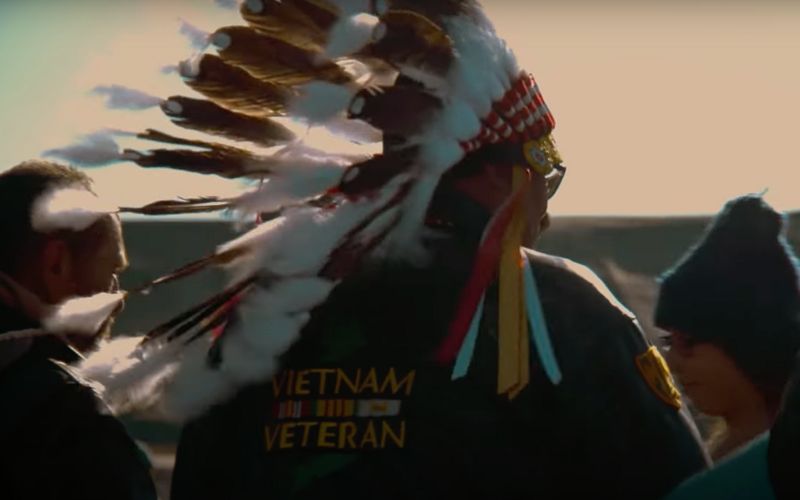
- Details
- By Native News Online Staff
The National American Indian Veterans (NAIV) organization will receive a congressional charter, marking the first Native American-dedicated group and the first veterans group to receive a charter in 15 years.
The charter was included in 2024 the National Defense Authorization and allows the organization to testify about veterans issues before Congress. It allows accreditation of NAIV members by the Department of Veterans Affairs to assist veterans and their families with benefit claims.
According to the Department of Veterans Affairs, charters — or laws passed by Congress that stipulate the mission, authority and activities of a group — have been granted to other nationalities and religious groups, but no Native American veterans organizations have received one. There are more than 140,000 Native Veterans in the United States, and advocates say a Native American charter is long overdue.
“We as veterans have been asking for this charter since 2004,” said Robert Dunsmore, Cheyenne River Sioux Tribe Veterans Service Officer, in a press release. “We, as American Indian veterans, hopefully will have a voice on matters that pertain to American Indian veterans.”
Originally established in 2004 on the Cheyenne River Sioux Tribal Reservation, NAIV originated from a 91-year-old Korean War veteran, Don Laudner, who focused on providing more representation for Native American veterans in their pursuit of VA benefits.
“It is a great honor to Headquarter the National American Indian Veterans on the Cheyenne River Sioux Tribe, and serve the needs of our brave Native American Veterans across the nation,” said Ryman LeBeau, Chairman of the Cheyenne River Sioux Tribe, in a press release. “We honor the sacrifices made by our ancestors before us, and our warriors – the Veterans who unwaveringly answer the call to stand up to protect the people and our future generations,”
American Indians and Alaska Natives serve in the U.S. Armed Services at a higher rate and are less likely to have health insurance or a service-connected to disability compared to other veterans, according to the Veterans Health Administration.
“We owe a great debt to Native American veterans for their service and sacrifice. I’m glad Congress is finally recognizing their service with a Congressional Charter. The NAIV is a critical resource that delivers assistance, and securing this charter ensures that Native veterans can access the benefits they have rightfully earned.” said New Mexico Senator Ben Ray Luján in a press release.
NAIV, endorsed by the National Congress of American Indians and other tribal and veterans organizations, now joins alongside other prominent veterans service organizations like the American Legion, Veterans of Foreign Wars, and Disabled American Veterans.
Joey Strickland, a retired colonel of Choctaw descent and NAIV’s chief of staff, told Military Times the group is looking to include better organization efforts, as well as grow its membership to represent a broader Indigenous community.
“We’re excited, but we now realize the hard work has to start,” Strickland said. “There’s just a lot of work that needs to be done.”
More Stories Like This
Native News Weekly (August 25, 2024): D.C. BriefsUS Presidents in Their Own Words Concerning American Indians
Indigenous Actor Elaine Miles Reports Detention by Alleged ICE Agents
Happy Thanksgiving from Native News Online
Coming Up on Native Bidaské: Behind the Animation: Joey Clift Talks “Pow” and Native Storytelling
Help us tell the stories that could save Native languages and food traditions
At a critical moment for Indian Country, Native News Online is embarking on our most ambitious reporting project yet: "Cultivating Culture," a three-year investigation into two forces shaping Native community survival—food sovereignty and language revitalization.
The devastating impact of COVID-19 accelerated the loss of Native elders and with them, irreplaceable cultural knowledge. Yet across tribal communities, innovative leaders are fighting back, reclaiming traditional food systems and breathing new life into Native languages. These aren't just cultural preservation efforts—they're powerful pathways to community health, healing, and resilience.
Our dedicated reporting team will spend three years documenting these stories through on-the-ground reporting in 18 tribal communities, producing over 200 in-depth stories, 18 podcast episodes, and multimedia content that amplifies Indigenous voices. We'll show policymakers, funders, and allies how cultural restoration directly impacts physical and mental wellness while celebrating successful models of sovereignty and self-determination.
This isn't corporate media parachuting into Indian Country for a quick story. This is sustained, relationship-based journalism by Native reporters who understand these communities. It's "Warrior Journalism"—fearless reporting that serves the 5.5 million readers who depend on us for news that mainstream media often ignores.
We need your help right now. While we've secured partial funding, we're still $450,000 short of our three-year budget. Our immediate goal is $25,000 this month to keep this critical work moving forward—funding reporter salaries, travel to remote communities, photography, and the deep reporting these stories deserve.
Every dollar directly supports Indigenous journalists telling Indigenous stories. Whether it's $5 or $50, your contribution ensures these vital narratives of resilience, innovation, and hope don't disappear into silence.
 The stakes couldn't be higher. Native languages are being lost at an alarming rate. Food insecurity plagues many tribal communities. But solutions are emerging, and these stories need to be told.
The stakes couldn't be higher. Native languages are being lost at an alarming rate. Food insecurity plagues many tribal communities. But solutions are emerging, and these stories need to be told.
Support independent Native journalism. Fund the stories that matter.
Levi Rickert (Potawatomi), Editor & Publisher

